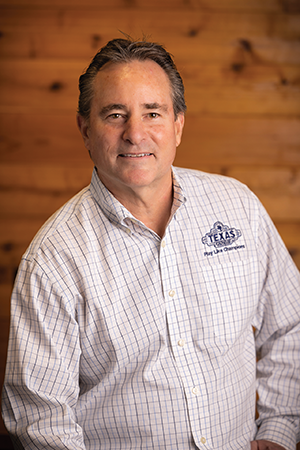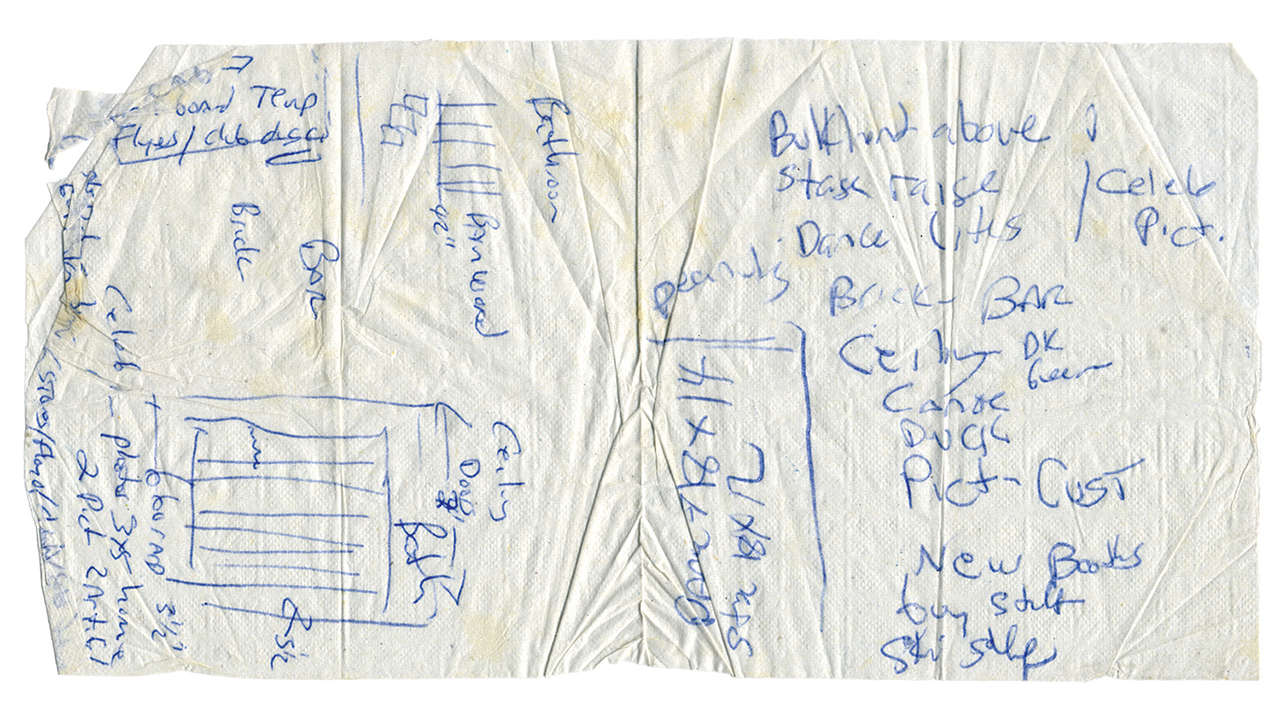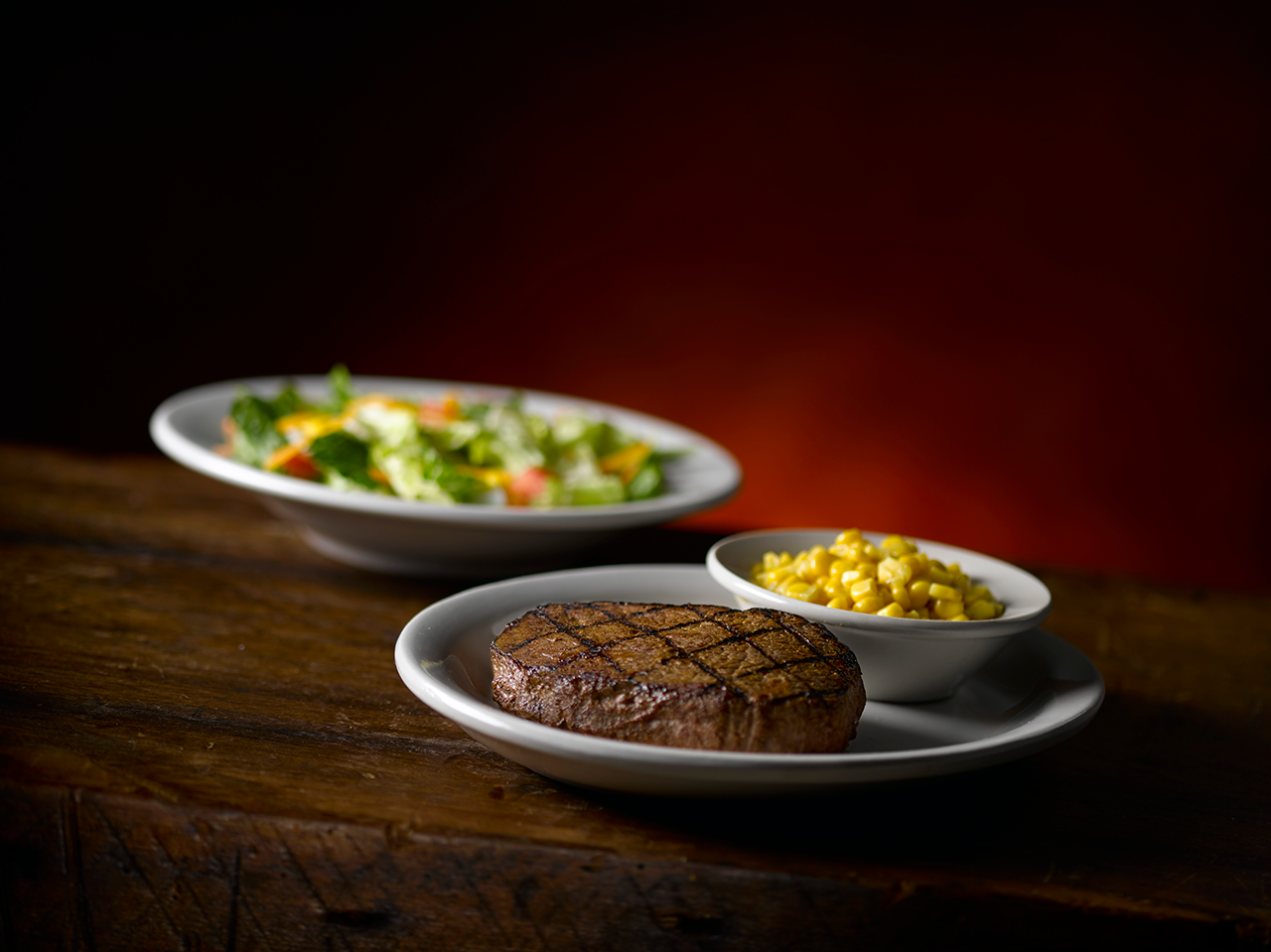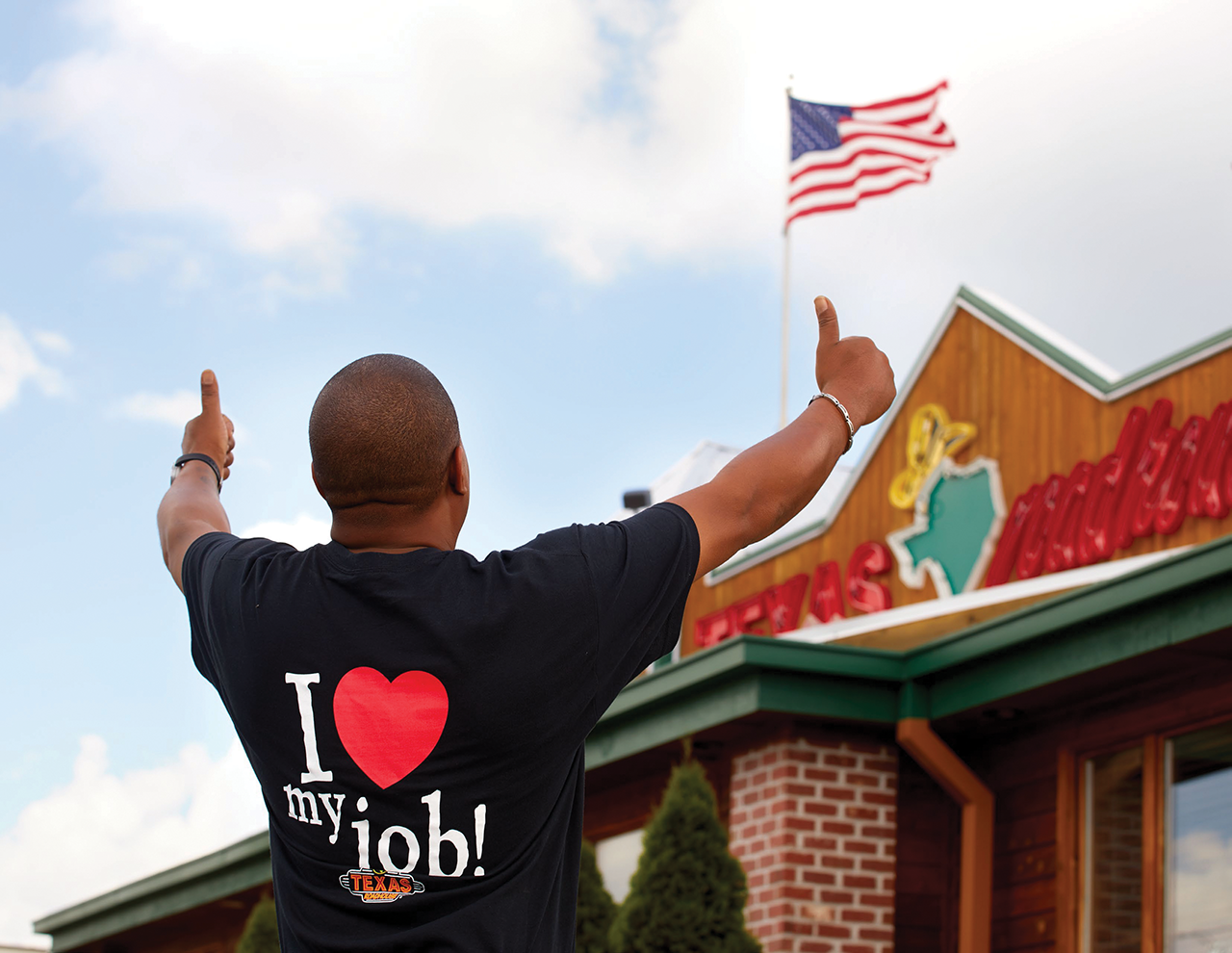Hundreds of people crowd into a spacious, windowless, industrial room in Louisville, Ky., that normally plays host to church youth events. Most of the guests are adorned in red, white, and blue, and American flag bunting hangs from a second-floor balcony.
 One might mistake the event for a July Fourth celebration, but it’s Sept. 27, 2024 — Founder’s Day at Texas Roadhouse, the day the company celebrates the life of late founder Kent Taylor, left. Rain forced the event into this backup location — organizers initially planned to host in a baseball stadium — but the mood is no less celebratory, with plenty of clapping, hollering, and laughing as speakers and musicians grace the stage.
One might mistake the event for a July Fourth celebration, but it’s Sept. 27, 2024 — Founder’s Day at Texas Roadhouse, the day the company celebrates the life of late founder Kent Taylor, left. Rain forced the event into this backup location — organizers initially planned to host in a baseball stadium — but the mood is no less celebratory, with plenty of clapping, hollering, and laughing as speakers and musicians grace the stage.
Taylor is everywhere in the celebration: His caricature, like one drawn at an amusement-park kiosk, looms over the crowd of hundreds of company employees — aka “Roadies” — donning his signature cowboy hat and the dual braids of his close friend, musician Willie Nelson. Stories of his outsized personality and contributions to the company and community flow from every speaker who takes the stage.
The vibes in the room are all positive despite the somber undertone of the fact that the guest of honor cannot be in attendance. What Taylor left behind has given them plenty to celebrate: The 2024 Brand Icon has defied all odds since the beginning of the pandemic, with robust sales and traffic increases. Same-store sales and traffic have been up each quarter this year — better than 8.5% for the former and 5% for the latter in the third quarter. Texas Roadhouse grew sales by 13.8% in 2023 to close the year at $4.78 billion in U.S. sales at 638 locations, making it the 19th largest restaurant chain by sales domestically and second-largest full-service chain.
Customer by customer and Roadie by Roadie, the Texas Roadhouse legend has grown for 31 years to this raucous moment when hundreds of Roadies honor the brand Taylor built.
 “In my opinion, Kent is the owner of this company. [There’s] only been one owner of our company,” said Jerry Morgan, left, who was hand-picked by Taylor to succeed him as CEO when the founder died in March 2021. “But I am his partner, as well as all of us here, to uphold the standards and expectations of what ‘legendary’ is. Our mission is ‘Legendary Food, Legendary Service.’ Our core values are passion, partnership, integrity, and fun. We've been known to have a little bit of fun around here. We have to keep that piece. That's the culture piece, that if you can perform, if you can do all the things that are expected, you can have a little fun along the journey.”
“In my opinion, Kent is the owner of this company. [There’s] only been one owner of our company,” said Jerry Morgan, left, who was hand-picked by Taylor to succeed him as CEO when the founder died in March 2021. “But I am his partner, as well as all of us here, to uphold the standards and expectations of what ‘legendary’ is. Our mission is ‘Legendary Food, Legendary Service.’ Our core values are passion, partnership, integrity, and fun. We've been known to have a little bit of fun around here. We have to keep that piece. That's the culture piece, that if you can perform, if you can do all the things that are expected, you can have a little fun along the journey.”
All in the details
Taylor’s presence at Texas Roadhouse’s headquarters (“support center”) is felt even before one walks through the glass front doors. A life-sized bronze statue of the founder stands on the sidewalk in front of the Louisville building, donning the cowboy hat and Willie braids but also an unbuttoned Hawaiian shirt, flip flops, sunglasses, and cigar and can of beer in one hand.
It's the perfect introduction to a man whose image and essence are unavoidable inside the support center, from the replica untidied office employees built inside the lobby, to the cardboard Budweiser crate that Taylor used to use as a brief case mounted on the wall, to the framed final email he sent to the company.
Starting with some chicken scratch on a cocktail napkin, Taylor founded Texas Roadhouse in 1993 — not in Texas, and not in Kentucky, but in Clarksville, Ind., just across the Ohio River from his hometown of Louisville. Even from Day 1, Taylor was obsessed with the details that would drive Texas Roadhouse’s success.

Texas Roadhouse founder Kent Taylor first sketched his plan for the restaurant on a napkin.
“The first several restaurants that I opened with Kent, he would come in about midnight with me before we open and we would literally go around the restaurant and we would hang every artifact. We would hang every picture together; we would adjust all the lighting; we would adjust all the music,” said Jeff White, a Texas Roadhouse managing partner who has worked for the company since the beginning. “He was so detail-oriented about everything, whether it be food, whether it be atmosphere, decor. He truly was a visionary.”
Amazingly, little has changed at Texas Roadhouse in 31 years aside from the size of the company. The “Legendary Food, Legendary Service” tagline that Taylor instituted has been the roadmap from which the brand has never strayed. Since the beginning, Texas Roadhouse has offered hand-cut steaks and an expansive menu of made-from-scratch favorites. The restaurants have been loud and rowdy. And the Roadies have offered a smiling face to the customers who fill the booths from 3 to 10 p.m. on weekdays and 11 a.m. to 10 p.m. on weekends.
“[Taylor] taught us about what a true people-first culture is all about, and so we've been doing it since I came to Roadhouse all those years ago. It's about being a servant leader,” said Gina Tobin, the company’s president who started at Texas Roadhouse in 1996. “How do we serve others? It's not about me. Kent made an upside-down pyramid from the beginning of time and our Roadies come first. How we serve them comes first.”
Skin in the game
It’s 5 p.m. and the Louisville-area Texas Roadhouse is already slammed. The music is loud, the numerous birthday songs hollered by the wait staff at table after table are louder. White races around the restaurant doing odd jobs here and there, frequently speaking into an earpiece like someone in the secret service.
“We're more than just a general manager,” White said after finding a few minutes to tuck himself into a booth, the words “Kent’s Corner” hanging on the wall over his shoulder, a few booths behind him. “We really care about our food quality and our service and the things that truly make Texas Roadhouse tick.”
If you really want to know what makes Texas Roadhouse so iconic, you have to start with the managing partners. The company’s owner-operator model is unique in the restaurant industry: managing partners are recruited by market partners who oversee a region of 10-12 restaurants. The managing partner pays $25,000 to take some ownership of their restaurant and then gets to keep 10% of that location’s profits.
Morgan calls the managing partner the “center of the universe” who is doing everything from greeting guests to serving food to doing community outreach. And Morgan should know: He joined Texas Roadhouse in 1997 as the managing partner of the first Texas location, in the Dallas suburb of Grand Prairie.
“They are partners in this company. I got to write a check to come in to be a managing partner. So I had skin in the game. I was betting on myself,” he said. “That's what it was designed to do, is to have a peace of mind knowing that I'm going to have my name over the door and I really have a say in what the business does.”
Like Morgan, Tobin started as a managing partner at Texas Roadhouse, among the first in the company when she was hired in 1996. She likens the managing partner model to owning versus renting. Typical general managers are of course important to the success of their restaurants, but they’re also just clocking into work every day and might not treat the position as seriously as if they owned the business they clocked into.
“As we like to say, you get to write your own paycheck, so whatever you put into it, you get back out,” she said. “The harder you work, the more successful you are, the more money you earn. That's the model that works for us and we don't plan on changing that at all.”
Another unique attribute of Texas Roadhouse’s, particularly considering the staggering success the company has had, is the fact that it does little to no national advertising. Instead, each managing partner is expected to plant roots in their community by building relationships with companies, churches, schools, and other organizations.
Those relationships often start with one of the company’s “bread runs,” when a Texas Roadhouse rep carts around a box of the chain’s beloved rolls as an introduction to local groups.
“We want our marketing to be in our own communities,” White said. “So we have local-store marketers that are out there pounding the pavement.”
‘Legendary Food, Legendary Service’
There’s a reason Texas Roadhouse leads with its rolls: Customers obsess over them. Served in baskets with the brand’s signature cinnamon butter, the limitless rolls occupy hallowed ground to the hordes of devoted fans.
“I travel to over 100 restaurants a year and in my travels visiting stores … every plane I get on [people ask], ‘Do you have the rolls? Do you have the cinnamon butter?’” said Jason Mennie, the company’s senior director of legendary food. “And I'm like, ‘No, unfortunately I don't have those with me. They don't travel well.’”
Then there are the peanuts. A bag of peanuts awaits every table, and for a while Texas Roadhouse was famous for the fact that guests could discard peanut shells on the floor. Nowadays, for safety and sanitation purposes, there’s a small bucket on the table for the shell bits.
“We're a steakhouse, right? But [customers] always talk about our peanuts, our bread, and our butter before they even get to the steaks. But that's alright,” Morgan said with a laugh. “We love that piece of it too.”
The peanuts and rolls may inspire adoration from loyal guests, but it’s the hand-cut steaks that help drive average unit volumes at Texas Roadhouse to around $7.6 million. A display case greets guests when they walk in, highlighting the fresh cuts that have been hand-carved that day, from ribeye and sirloin to filet and T-bone. For guests who aren’t in the mood for a steak, there’s a vast menu of rib, seafood, chicken, salad, burger, and sandwich options.

The peanuts and rolls may inspire adoration from loyal guests, but it’s the hand-cut steaks that help drive average unit volumes at Texas Roadhouse to around $7.6 million.
Mennie oversees food safety, sanitation, and quality control at Texas Roadhouse, managing a roster of “coaches” in each market who train kitchen managers and ensure consistency. He points out that the reason Texas Roadhouse doesn’t open until dinner most days is because there’s so much prep that goes into the made-from-scratch menu. Managing partners and kitchen managers taste all of the food and ensure proper equipment temperatures every day. The whole operation is also costly; frozen, pre-made product would increase profits and make kitchen operations far more efficient, potentially opening up new revenue streams and labor savings. But it’s not the Texas Roadhouse way. “We truly believe our success is because of what we do and how we do it,” he said.
That consistency also means that very little changes on the menu. In the 22 years he’s been with the brand, Mennie said, the company has added “a dozen, maybe less than a dozen” items to the menu. He credits the chain’s success to that predictability: “People know what they're going to get when they come to us.”
“I will tell you that the food is what matters,” Morgan added. “Other brands and other companies may be not as committed to it, but we have to keep our food made from scratch, smoking hot, picture-perfect recipes. That is really what the consumer is paying for.”
Something consumers don’t have to pay for but expect nonetheless is the second half of Texas Roadhouse’s tagline: legendary service.
The army of servers who crisscross White’s Texas Roadhouse wear t-shirts that say “I love my job” on the back, and it’s not just lip service. With its inverted pyramid that prioritizes Roadies, Texas Roadhouse is maniacal about investing in its people. Store-level Roadies have access to regular training and good pay, plus regular ongoing awards and contests that keep things fun and lively, with real incentives attached.
“I feel like most of our employees really love their jobs and in turn, it shows to our guests,” White said. “When that employee walks up and they've got a smile on their face and they're enjoying what they're doing, they're going to give you a much better experience than someone that doesn't want to be there.”

Texas Roadhouse is maniacal about investing in its people.
The return on investment is real: White said he has 12 employees in his kitchen who have worked for him for “18 or 19 years.”
Morgan added that in his first few years as CEO, he felt pressure to have servers wait on more tables and cut labor. But, similar to the special attention paid to food, the extra investment in hospitality pays real dividends for Texas Roadhouse.
“We create an environment where employees want to work and our guests want to spend their time and their money. I've said that over and over again, and it's really that simple to us,” he said. “It's about having fun. We're kind of a rowdy crowd, right? We're loud and proud and we're OK with that. We line dance. We have higher-elevated volume of country music. But that music is our energy. We are an energetic, enthusiastic company and we're excited to do business. That's who we are. That's who our identity is.”
Little changes, big differences
In some ways, Texas Roadhouse feels frozen in time. It’s not just that the menu and restaurants rarely change; it’s that they feel timeless, a slice of Americana in a sea of ever-modernizing restaurant concepts.
But that doesn’t mean the company isn’t innovating. In fact, Texas Roadhouse has recently turned its attention to innovations in the back of house to enhance Roadie productivity and efficiency. That’s included resources like digital training videos for Roadies in the kitchen, as well as its AGM guest management platform that allows customers to put their name on the wait list digitally and receive a text when their table is ready. Most notably, Texas Roadhouse rolled out a new digital kitchen system that digitizes and simplifies the ticket system.
“Anything we can do that would help expedite that without you getting rid of the human interaction, then we have to consider that as a good option,” Morgan said.
White noted that the digital kitchen better organizes cooking systems so that food is delivered to tables as quickly and efficiently as possible. That little change makes a big difference for a company like Texas Roadhouse that is constantly at capacity.
“As busy as we are, table turns are kind of a big thing. How do you get more sales out of your building?” White said. “Well, when you're busy, you're only open X amount of hours and you only have so much time to get those sales in. So the faster you can turn those tables without making the guests feel rushed, the better off you are as far as your sales are concerned.”
One way Texas Roadhouse almost certainly will not innovate — at least any time soon — is with delivery. The company resisted moving to third-party platforms during the pandemic and continues to eschew the channel, both because it would have to give up some quality control to a delivery driver and because the sales are not totally needed. White said his to-go business ballooned from below 10% pre-COVID to roughly 20% of sales — and stayed there.
“It is expensive to do delivery for the consumer, and we believe in ourselves that our value is built into our menu,” Morgan said. “Fortunately for us, we don't have to do it.”
Protecting the legacy
Back at the Founder’s Day celebration, it’s evident that while Taylor has been gone nearly four years, his impact and legacy are alive in the hundreds of support center Roadies and thousands of store Roadies who carry the Texas Roadhouse brand into the future. To a person, each one shares stories of Taylor’s generosity and leadership unsolicited in conversation.
“I absolutely love Kent. He taught me so much, taught me not only about Texas Roadhouse, but about people and about his philosophies,” Tobin said. “And it's my job now to protect that. I wake up every day … to protect these brands and his legacy.”
It’s Morgan’s job as CEO, meanwhile, to ensure the company stays on the path Taylor had laid out before them. And so far, so good. That may be because Morgan was a natural pick to succeed Taylor, possessing the same kind of cowboy swagger that the founder boasted, but also a similar easy-going accessibility and a good sense of fun (he likes to close earnings calls with a “Yeehaw!”).
What could have seemed like an impossible task — suddenly filling the shoes of a beloved founder who had built one of the biggest restaurant chains in America — has become a welcome challenge, one made all the more achievable by the foundations that Taylor built.
“I just leaned back on the things that I knew to do,” Morgan said. “Running one restaurant or a market or region is a lot of the same philosophies I use as running a company: Be genuine. Be honest. Set clear expectations. And then challenge people to perform at a higher level.
“I'm proud to say that [Taylor] was my friend, my partner, my mentor, and if he trusts me to take over his company…” he added, pausing. “I wrote a promise to this company when I first took over, that they would get every ounce that I have to serve them at the highest.”
Contact Sam at [email protected]




